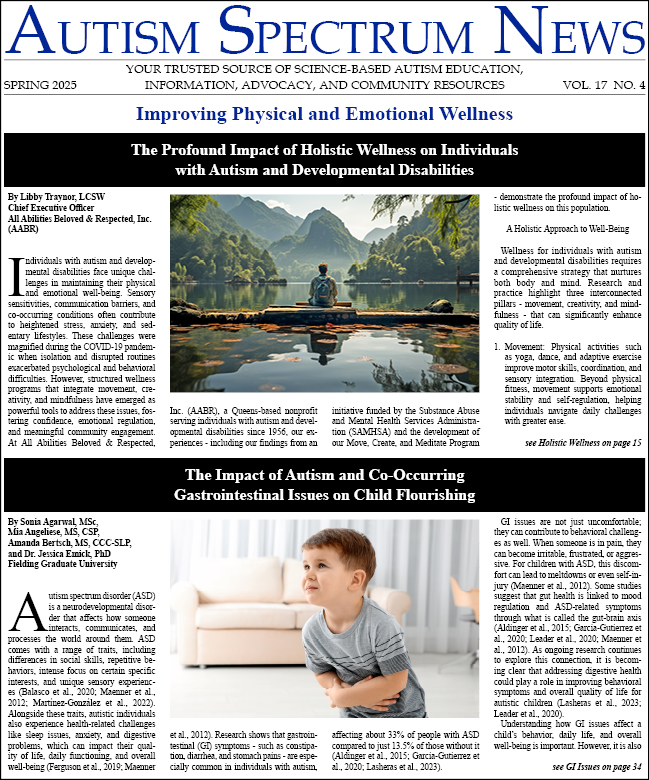-
Through Distorted Lenses: The Unacknowledged Impact of Visual Perception Differences in Autism
“In daily life, seeing is intricately linked to understanding, with (visual objects)…functioning as preferred carriers of meaning and understanding. However, a closer look at visual practices demonstrates that the connection between sight, visual imagery, and understanding and interpreting them...
-
Preventing the Hidden Burnout Crisis in Autistic Women and Girls
One of the most heart-wrenching things I realized as a late-identified Autistic woman was just how disconnected I was from my true self. Decades of masking, of becoming a professional-level chameleon, left me feeling like I didn't even know who "me" was anymore. It was this constant, buzzing,...
-
Beyond Picky Eating: Supporting Lifelong Health in Autistic Children
Picky eating in autism is more than just a childhood phase. Research shows that atypical eating behaviors—such as extreme food selectivity and hypersensitivity to textures—are common in autistic children. One study found that 70% of children with autism display atypical eating patterns,...
-
Yes, We Can Socialize
Throughout my life as an autistic person, I have been fortunate to have experienced great moments where I have been able to socialize with others and gain long-lasting friendships. There were also times when, due to my misunderstanding of certain social situations and the anxiety that comes with...
-
Practical Tips for a Sensory-Friendly Christmas for Autistic Children
Christmas is just around the corner. Unlike the white, snow-covered wonderland that many associate with Christmas, the festive season can be very lively and noisy and filled with appointments and various stimuli. There is a well-known quote that I think puts into words the way autistic...
-
Amid Increasingly Extreme Weather, Autistic Individuals Left Particularly Vulnerable to Climate Change Effects
Sherman Gillums Jr., the Federal Emergency Management Agency Director of Disability Integration and Coordination, remembers the event that made him realize emergency responses during natural disasters needed to be more autism-inclusive. In the throes of Hurricane Ian — the fifth strongest storm...
-
Supporting Autistic Individuals in Driver Education: A Systematic Approach
Learning to drive is a significant milestone, symbolizing greater independence and autonomy. Driving independently offers freedom, builds confidence, and encourages self-reliance, empowering individuals to make their own decisions (Cheak-Zamora, Tait, & Coleman, 2022). Additionally, independent...
-
Navigating Sex as an Autistic Adult
It has long been thought that autistic adults desire sex at a lower rate than the general population, and recent research has shown this to be an incorrect assumption seeded with infantilization (Weir et al., 2021). Although autistic adults often need accommodations to be made regarding sensory...
-
The Increasing Popularity of Telehealth Services for Autism Spectrum Disorders
Children and young adults with autism spectrum disorders (ASD) often find it challenging to visit the doctor’s office due to a variety of sensory, social, and communication barriers. The sights, sounds, smells, and textures commonly found in a doctor’s office can be overwhelming and can trigger...
-
The Neuro-Strength-Based Support Framework: A Collaborative, Strength-Focused Approach to Autism Interventions
Autism remains an enigma to some despite decades of research and a plethora of interventions aimed at addressing its myriad facets. Historically, interventions have been crafted to mitigate perceived developmental, sensory, and behavioral deficits without a solid foundation in the bio-neurological...






